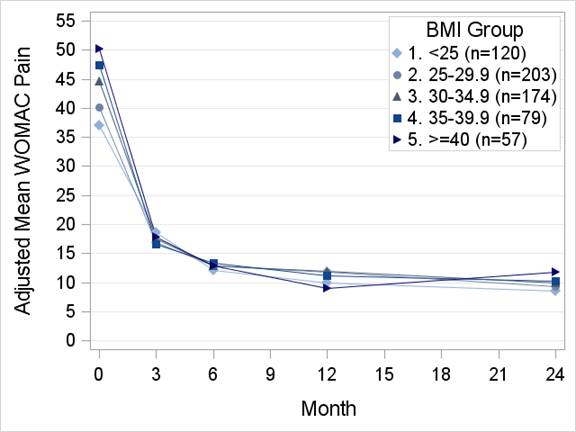Session Information
Session Type: ACR Concurrent Abstract Session
Session Time: 2:30PM-4:00PM
Background/Purpose: Utilization of total knee arthroplasty (TKA) continues to grow. Recent literature has questioned the appropriateness of TKA for patients that are morbidly obese, citing the high risk of complications. Data on the impact of obesity on patient-reported outcomes following TKA remain sparse. We assessed the extent to which obesity level affects patient-reported outcomes in pain, function, and satisfaction with surgery following TKA.
Methods: We followed a cohort of TKA recipients 40 years or older with a primary diagnosis of osteoarthritis scheduled for TKA at four tertiary medical centers. We stratified patients into 5 groups using the World Health Organization categories for obesity based on body mass index (BMI). We assessed whether obesity category is associated with post-operative pain and function evaluated at 24 months, as well as baseline to 24 month changes in pain and function. We used a piecewise linear model with a knot at 3 months to determine covariates associated with early and late TKA recovery. Multivariable models adjusted for age, sex, race, diabetes, musculoskeletal functional limitation index, medication use and study site.
Results: 691 patients were enrolled across 4 centers, with 633 providing baseline BMI information and outcomes at one or more follow-ups. At baseline 19% were normal weight (BMI < 25), 32% were overweight (25 ≤ BMI <30), 27% were obese (30 ≤ BMI <35), 12% were morbidly obese (35 ≤ BMI <40) and 9% were severely obese (BMI ≥40). There were differences in baseline characteristics between BMI groups. Heavier subjects tended to be younger, were more likely to be female, non-White, and have diabetes. Study participants with higher BMI had worse preoperative WOMAC Pain and Function, with mean pre-operative pain score ranging from 34 in normal weight participants to 50 in severely obese participants, and mean pre-operative function score ranging from 35 in normal weight participants to 51 in severely obese participants. Patients in all BMI groups showed substantial improvement in pain (Figure). At 24 month follow-up there was no significant difference in WOMAC Pain between the BMI Groups. The results suggested that more obese patients had a steeper recovery slope from baseline to 3 months, and no difference in slope by BMI group between 3 and 24 months. Results were similar for WOMAC Function. All groups reported high satisfaction with the results of surgery, with 75% very satisfied at month 6 and 80% very satisfied at month 24.
Conclusion: Despite worse pain and functional status preoperatively, subjects in all BMI groups achieved similar pain relief and functional improvements following TKA. From the standpoint of patient reported outcomes, TKA is highly effective in obese patients. Figure. Adjusted Mean WOMAC Pain by BMI Group and Timepoint 
To cite this abstract in AMA style:
Collins JE, Yang HY, Usiskin IM, Katz JN, Losina E. Does Morbid Obesity Negatively Affect Patient Reported Outcomes Following Total Knee Arthroplasty? [abstract]. Arthritis Rheumatol. 2016; 68 (suppl 10). https://acrabstracts.org/abstract/does-morbid-obesity-negatively-affect-patient-reported-outcomes-following-total-knee-arthroplasty/. Accessed .« Back to 2016 ACR/ARHP Annual Meeting
ACR Meeting Abstracts - https://acrabstracts.org/abstract/does-morbid-obesity-negatively-affect-patient-reported-outcomes-following-total-knee-arthroplasty/
